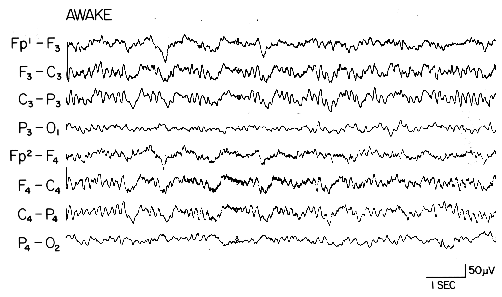Warren T Blume, MD, FRCP(C)
Professor, Department of Clinical Neurological Sciences, Director, EEG Laboratory,
London Health Sciences Centre, London, Ontario
Presented with an elderly patient exhibiting apparent cognitive decline, the physician must address three questions: (1) Does the decrease in apparent intellectual performance represent true dementia or pseudo-dementia? (2) Is there a treatable etiology? and (3) What is the prognosis? Of the diagnostic tests that society can afford, a well performed EEG can answer these questions as well as any test--after a thorough functional enquiry and physical examination.

Diffuse, persistent, excess delta (1-3 Hz) activity in this awake 75 year old man with cognitive decline. Alzheimer's disease, a principal cause of dementia in the elderly, can produce several EEG abnormalities: a slowing of background rhythms, the appearance of diffuse slow-waves, triphasic waves, and a lack of clear EEG distinction between wakefulness, drowsiness, and light sleep. Rae-Grant et al. found a true dementing illness in 38 of 39 elderly subjects when such features appeared persistently in the recording and in 31 of 39 in whom they appeared intermittently.